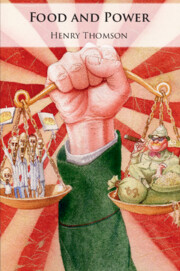Crossref Citations
This Book has been
cited by the following publications. This list is generated based on data provided by Crossref.
Thomson, Henry
2019.
Conflict termination, signals of state weakness and violent urban social disorder in the developing world.
Third World Thematics: A TWQ Journal,
Vol. 4,
Issue. 2-3,
p.
94.
Hassan, Mai
2020.
Regime Threats and State Solutions.
Kosec, Katrina
and
Mogues, Tewodaj
2020.
Decentralization Without Democracy.
World Politics,
Vol. 72,
Issue. 2,
p.
165.
Koop, Christel
and
Kessler, Philip
2021.
Keeping control of regulation? Domestic constraints on the creation of independent authorities in emerging and developing economies.
Governance,
Vol. 34,
Issue. 2,
p.
545.
Park, Yeon Kyung Grace
2021.
Let it float: Inflation and states’ priority on monetary independence over exchange rate stability.
Politics,
Vol. 41,
Issue. 3,
p.
371.
Samuels, David J.
and
Thomson, Henry
2021.
Lord, Peasant … and Tractor? Agricultural Mechanization, Moore’s Thesis, and the Emergence of Democracy.
Perspectives on Politics,
Vol. 19,
Issue. 3,
p.
739.
Wells, Jonathan C. K.
Marphatia, Akanksha A.
Amable, Gabriel
Siervo, Mario
Friis, Henrik
Miranda, J. Jaime
Haisma, Hinke H.
and
Raubenheimer, David
2021.
The future of human malnutrition: rebalancing agency for better nutritional health.
Globalization and Health,
Vol. 17,
Issue. 1,
Biasillo, Roberta
and
da Silva, Claiton Marcio
2021.
The Very Grounds Underlying Twentieth-Century Authoritarian Regimes: Building Soil Fertility in Italian Libya and the Brazilian Cerrado.
Comparative Studies in Society and History,
Vol. 63,
Issue. 2,
p.
366.
Kravtsov, Vlad
2022.
Autocracy and Health Governance in Russia.
p.
41.
Kravtsov, Vlad
2022.
Autocracy and Health Governance in Russia.
p.
1.
Hassan, Mai
Mattingly, Daniel
and
Nugent, Elizabeth R.
2022.
Political Control.
Annual Review of Political Science,
Vol. 25,
Issue. 1,
p.
155.
Ballard-Rosa, Cameron
Carnegie, Allison
and
Schonfeld, Bryan
2023.
The Geography of Democratic Discontent.
British Journal of Political Science,
Vol. 53,
Issue. 2,
p.
366.
Thomson, Henry
Bahgat, Karim
Urdal, Henrik
and
Buhaug, Halvard
2023.
Urban Social Disorder 3.0: A global, city-level event dataset of political mobilization and disorder.
Journal of Peace Research,
Vol. 60,
Issue. 3,
p.
521.
Daum, Thomas
Biesalski, Hans Konrad
Blaschke, Nikola
Bosch, Christine
Güttler, Denise
Heni, Jakob
Kariuki, Juliet
Katusiime, Roseline
Seidel, Anna
Senon, Zinsou‐Narcisse
Woode, George
and
Birner, Regina
2023.
Nutrition‐sensitive lockdowns: Conceptual framework and empirical insights from Africa during COVID‐19.
Development Policy Review,
Vol. 41,
Issue. 3,
Sharma, Rohit
Shishodia, Anjali
Kamble, Sachin
Gunasekaran, Angappa
and
Belhadi, Amine
2024.
Agriculture supply chain risks and COVID-19: mitigation strategies and implications for the practitioners.
International Journal of Logistics Research and Applications,
Vol. 27,
Issue. 11,
p.
2351.



